ART: History+Theory+Cultures
The Bachelor of Arts (Fine Art) is moving to a two-stage enrolment process in 2018. In stage one, you will enrol online in your courses for semesters one and two 2018. In stage two, you will select your semester one classes for Fine Art Studio and Workshop, and semester one or semester two classes for ART: History+Theory+Cultures in 2018.
This page will assist you with stage two of the enrolment process. Here you will find a list of potential ART: History+Theory+Cultures classes. (Note: There is a separate page for Fine Art Studio and Workshop classes) You will only take one ART: History+Theory+Cultures class in 2018, but you need to list three (3) preferences. These classes will be run with both second and third year students under the following course codes:
ART3: History+Theory+Cultures HUSO 2403 (2nd year students)
ART4: History+Theory+Cultures HUSO 2405 (3rd year students)
Read the list below carefully and select three ART: History+Theory+Cultures classes you would be happy to enrol in for 2018. Take note of which semester the class is running and then enrol in a university elective in the alternative semester.
In February 2018, we will post a link to a google form on this page so that you can nominate your preferred ART: History+Theory+Cultures classes. The form will have three (3) drop-down menus with the ART: History+Theory+Cultures classes listed. You will need to nominate your first, second and third ART: History+Theory+Cultures class preferences.
IMPORTANT – You must not repeat any class in your preference lists. Every effort will be made to place you in your first preference classes.
Semester 1, 2018
ART: History+Theory+Cultures Classes
The following ART: History+Theory+Cultures classes will be running in Semester 1, 2018. If you you would like to take one of these classes in semester 1, you will need to enrol in your university elective course in semester 2.
To take any of the following classes you must be enrolled in either:
HUSO 2403 (2nd year students)
or
HUSO 2405 (3rd year students)
Art & Place
In this course you will examine how art and other cultural activities reflect, shape and transform place. The emphasis will be on contemporary and urban examples, and these will be used as a foundation from which to trace historical developments and ideas. Place will be approached as a material, social and symbolic space, and examples will draw on a range of art examples. The course will also introduce you to the impacts and transformations of globalization, which are experienced through a local context. Topics to be covered include: defining place, public art, social spaces, site specific practices, mapping the city, memory, technology and the city, the sensory city. imagined cities and urban ecologies. In this course, art is referred to in the broadest sense and examples will be drawn from fine art practices and other forms of cultural production including film, media, design and architecture.
Lecturer: Kristen Sharp
Hours: 3 hours a week for 12 weeks, Mondays.
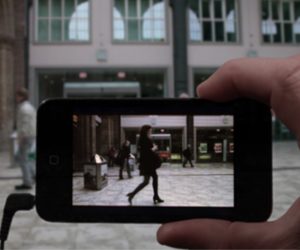
Image: Janet Cardiff and George Bures Miller (2012) Alter Bahnhof Video Walk, Kassel Germany dOCUMENTA (13).
Jewellery Histories
This course examines diverse themes, ideas and histories in Gold & Silversmithing. It introduces you to historical and theoretical contexts for precious and wearable objects relevant to contemporary practices. The course will highlight important historical, archaeological and anthropological collections and contexts for objects, with a specialised emphasis on metalsmithing, jewellery and local practices. The course will delivered through a range of seminars, lectures, and gallery/museum visits.
Lecturer: TBC - Contact Kristen Sharp for information.
Hours: 3 hours a week for 12 weeks, Mondays TBC.
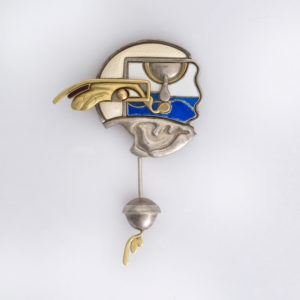
Image Credit: V.Glenville-Anson, Brooch, 1976, Enamel, ivory, silver, gold, W.E. McMillan Collection, image Courtesy of the RMIT Collection.
Media Art Cultures
This course will provide a broad overview and critical understanding of the contemporary media sphere and the role of technology in art practice. You will discuss and explore the origins of the computer in art practice, gender and art & technology, utopianism and art & technology, the de-materialisation of the art object, dead media, bio-art, haunted media, technology and perversity, the body and technology, The aesthetics of malfunction, and post-internet art practice. You will also consider the ways in which technology has fundamentally changed the role of the artist and how one can consider the changing definitions of contemporary art practice through the lens of the emerging technological media landscape. The course will delivered through a range of seminars, lectures, and gallery/museum visits.
Lecturer: Ian Haig
Hours: 3 hours per week for 12 weeks Tuesdays TBC
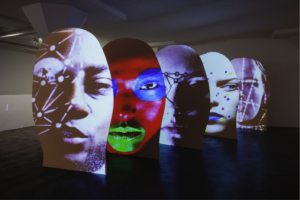
Image Credit: Tony Oursler, ImA, 2016, Video, Image Source: Metro Pictures.
Social Role of the Artist
In this course you will focus on the relationship between the artist and society. Key topics include: ideologies of the individual; the romantic ideals of the artist; questions of authorship and originality; equality, diversity and identity politics; Indigenous Australian artists and Sovereignty; the artist and the market; collaborative practices; participatory and socially engaged art practices; and the rise of contemporary ‘creative cultures’. You will examine these different ideas and approaches to being an artist through select examples and histories provided in lectures and seminars. These will provide you with strong and diverse cultural, theoretical and historical contexts. The emphasis is on critically engaging and debating the continually changing ideas about what it means to be an artist in different times, contexts and across practices.
Lecturer: TBC - Contact Kristen Sharp for information.
Hours: 3 hours per week for 12 weeks Mondays/Time TBC
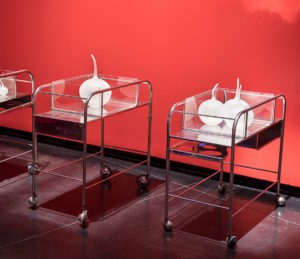
Image Credit: Yhonnie Scarce, Fallout Baby V, 2016. Sandblasted glass, acrylic and found hospital crib. Crib:82x81x43cm, 30 bush plums 12x5x5cm each. Source: ACCA. Photo: Andrew Curtis.Installation View Sovereignty ACCA, Melbourne 2016-17.
Theme & Variation (Flexible Semester)
This course examines select themes, ideas and practices in contemporary art. It introduces you to the relevant historical and theoretical contexts for these themes. Themes and concepts to be covered include aesthetics, formalism, psychoanalysis, identity, the body, surveillance, fashion, politics, and religion/spirituality. This course recognizes the importance of continuities and change in relation to the historical context for contemporary art practice.
Lecturer: Colleen Boyle
Hours: Intensive over 3 weeks in January 2018, Dates TBC
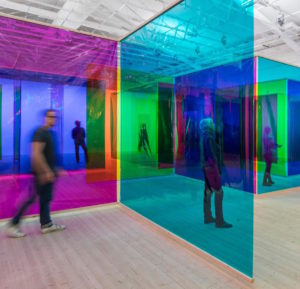
Image Credit: Olafur Eliasson Seu corpo da obra (Your body of work), 2011, Moderna Museet, Stockholm 2015, Source: olafureliasson.net/. Photo Anders Sune Berg.
Semester 2, 2018
ART: History+Theory+Cultures Classes
The following classes will be offered in Semester 2, 2018. If you you would like to take one of these classes, you will need to enrol in your university elective course in first semester.
To take any of the following classes you need to be enrolled in either:
ART2: History+Theory+Cultures HUSO2401 (1st year students)
or
ART3: History+Theory+Cultures HUSO 2403 (2nd year students)
or
ART4: History+Theory+Cultures HUSO 2405 (3rd year students)
Lens & Screen
In this course you will cover the development of photography, cinema, video and digital technologies from the 19thC to now. You be introduced to the central theories and practices of these lens & screen based technologies, and their relationship with art practice and visual culture. Some of the key topics that will be covered include: originality, reproduction and appropriation, digital and social media, the documentary and questions of truth and immediacy, the politics of representation, formalism, archive and memory, and experimental technologies. The emphasis of the course is on a critical and expansive approach to lens & screen based technologies and understanding their application across diverse art and cultural practices.
Lecturer: TBC - Contact Kristen Sharp for information
Hours: 3 hours per week for 12 weeks Mondays / Time TBC
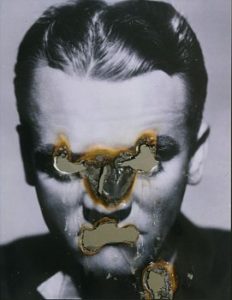
Image Credit: DOUGLAS GORDON, Self-Portrait of You + Me (James Cagney), 2006, Smoke and mirror, 30 x 27-1/2 inches (76.2 x 69.9 cm). Source: Gagosian.
Modernisms
In this course you will be introduced to modernism in art, with reference to issues that are central to practices and ideas in contemporary art. You will be introduced to key developments, terms and concepts of modernism in Euroamerican and Australian histories and their relevant cultural and historical contexts. Key topics that will be covered include: the avant-garde, industrialisation, abstraction, originality and reproduction, aesthetics and formalism, the ready-made, materiality and process, representation and identity. Material will be drawn from diverse practices from art, media, design and architectural sources. You will be introduced to the ways in which modernism challenges ideologies and institutions of art, including how artists critique modernism itself. You will be encouraged to critically reflect on these practices and ideas in class and in assessment work.
*ART 3 and ART 4 students please note: This class was previously known as HUSO2213 Art History & Theory 2 in 2017 and HUSO2186 Art History & Theory 1 in 2016. Do not select this class if you have already completed these courses in previous years.
Lecturer: Kristen Sharp
Hours: 3 hours per week for 12 weeks Mondays / Time TBC
![Image Credit: Meret Oppenheim, Eichhörnchen [Squirrel], 1969 fur, glass, plastic foam no.38 from an edition of 100 not signed or dated 23.0 (h) x 17.5 (w) x 8.0 (d) cm. Source: National Gallery of Australia, Canberra. NGA 2008.931 © Meret Oppenheim. Licensed by VISCOPY, Australia.](https://artschoolportal.com/wp-content/uploads/2017/11/Modernisms-286x300.jpg)
Image Credit: Meret Oppenheim, Eichhörnchen [Squirrel], 1969 fur, glass, plastic foam no.38 from an edition of 100 not signed or dated 23.0 (h) x 17.5 (w) x 8.0 (d) cm. Source: National Gallery of Australia, Canberra. NGA 2008.931 © Meret Oppenheim. Licensed by VISCOPY, Australia.
The Modern Object: Expanding Design and Craft Practices
In this course you will investigate how contemporary craft and design practices are informed by modernist histories, and how ideas of genre and discipline were challenged and expanded throughout the twentieth century. You will explore how key ideas such as function, skill, ornament, the interior and materiality intersect with concepts like environment, philosophy, ideology, technology and politics. You will also examine key debates at the intersection of craft and design and the cultural and historical contexts that inform artists and the artworks they make. You will be introduced to key terms and methods relevant to design and craft practices.
*ART 3 and ART 4 students please note: This class was previously known as HUSO2321 Makers & Materials. Do not select this class if you have already completed Makers & Materials in previous years.
Lecturer: TBC - Contact Kristen Sharp for information
Hours: 3 hours per week for 12 weeks Mondays / Time TBC
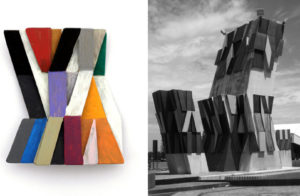
Image Credit: Peta Kruger, February 2012, Wear a piece of Adelaide group exhibition, Adelaide Centre for the Arts display space City Sign brooches, brass, paints.'City Sign' concrete sculpture by Otto Hajek, 1977 http://www.petakruger.com/index.php?/2012/wear-a-piece-of-adelaide/
The Long View: Modernity & Before
Beginning with the role of memory, history and time in sci-fi visions of the future, this course examines such questions as how contemporary art is shaped by history; what modernity is and when it began; why the concept of postmodernity is significantly flawed; and crucially: why history matters.
In considering such questions the course focuses on art and ideas from four major periods in European cultural history: classical antiquity; late medieval art & western renaissances; 17th century art and science; and 19th century romanticism- along with a range of contemporary art, film, and other cultural forms responding to these periods.
The course also identifies many of the philosophical and cultural legacies of European history that continue to shape late modern thought, along with some that form sharp contrasts with contemporary social values. The interdisciplinary content of this course is designed to encourage informed yet independent critical judgement in assessing a long view of modernity.
Lecturer: Linda Williams
Hours: 3 hours per week over 12 weeks, Mondays.
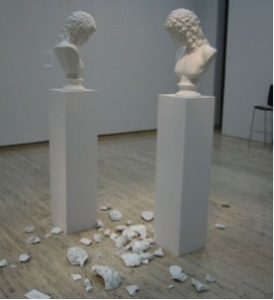
Image Credit:
Giulio Paolini The Other Figure 1984 –Coll. Art Gallery of NSW (plaster, Wood, Plinths- 180 x 250 x 190)
Contextualising Practice (3rd Year Only)
This final course builds on your skills and knowledge in art to provide a sophisticated conceptual, critical and theoretical framework for your own art practice. You will focus on specialized topics and themes considered relevant to contemporary art practice and discourse to develop your expertise in art. The course exposes you to a range of artists, ideas and practices and will locate and connect these in their appropriate cultural and historical contexts. You will participate in guided discussions and debates in class, and develop independent research skills to critically examine current and historical practices and ideas in art relevant to your own practice.
Lecturer: Kristen Sharp
Hours: 3 hours per week over 12 weeks
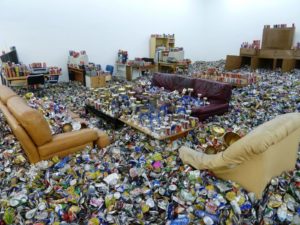
Image Credit: Thomas Hirschhorn Too Too-Much Much, 2010. Museum Dhondt-Dhaenens, Belgium. Installation view. Source: Museum Dhondt-Dhaenens.